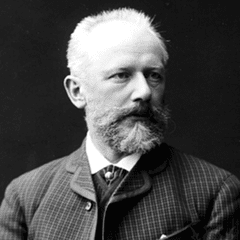You are here
Emotional Romanticism in Musical Form
Tchaikovsky's Symphony No. 4 in F minor, Op. 36, was written in 1877, a momentous year for the composer. Tchaikovsky dedicated his Symphony No. 4 to his patroness, the heiress Nadezhda von Meck. He had begun composing the symphony not long after Meck had entered his life. He would complete it in the aftermath of his catastrophic marriage and claimed in a letter she would find in it "an echo of your most intimate thoughts and emotions."
In 1877, at the age of 37, he wed a former student, Antonina Miliukova, age 19. The couple was mismatched both intellectually and sexually. Tchaikovsky left her after two and a half months of marital cohabitation. At the time of his departure, he was suffering from acute writer's block and was emotionally distressed. One well-accepted theory for the end of the marriage is that Tchaikovsky was gay, which was considered deviant and unacceptable at the time. These tumultuous circumstances led Tchaikovsky to melodically translate his profound emotions into his 4th Symphony.
The symphony opens with an ominous fanfare representing fate. According to a letter the composer wrote to Madame von Meck in 1878, the fanfare is "the fatal power which prevents one from attaining the goal of happiness ... There is nothing to be done but to submit to it and lament in vain." Tchaikovsky went on to explain the program of the first movement is—"roughly"—that "all life is an unbroken alternation of hard reality with swiftly passing dreams and visions of happiness." He went on: "No haven exists ... Drift upon that sea until it engulfs and submerges you in its depths."
The vigorous finale ends with an intense and triumphant coda. Tchaikovsky summed it up this way: “Never say that all the world is sad. You have only yourself to blame. There are joys, strong though simple. Why not rejoice through the joys of others? One can live that way, after all.”

Tchaikovsky